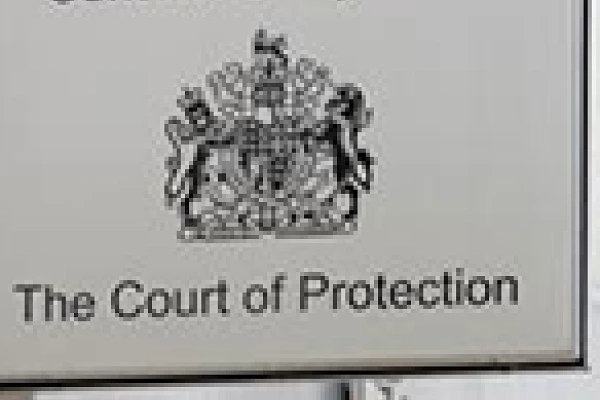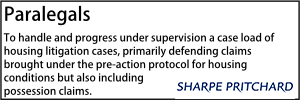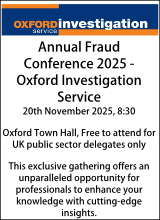
Excluded by definition: the narrow reading of “stepchild” and housing succession claims
Consistency in disciplinary processes
What the Epping Forest injunction case means for local authorities across England
Exclusions – lessons from the last academic year
New statutory guidance on RSHE

Tracking down the abducted ‘P’
What does the law say about hair strand testing?
Document experts in age assessment disputes: Ask the court’s permission, not its forgiveness
Ethics and Integrity Commission: a new chapter in public standards oversight
Allocation of temporary accommodation, transfer lists and discrimination

Instruction of experts in housing disrepair claims
From Wikimedia to the wider web: What the High Court’s judgment means for the Online Safety Act 2023
The Health and Social Care (Wales) Act 2025 – eliminating profit from the care of looked after children
Inability to speak at a planning committee meeting and prejudice
Changes to the subsidy control statutory guidance August 2025
A new planning bill for Wales: What will this mean?
The landfill tax and local authorities
REMA Update: New direction for electricity market reform
FOI is a collateral attack on enforcement
The Legal Department of the Future and the Monitoring Officer
It was Darkest Before The Dawn
In ‘n’ Out – insourcing vs outsourcing
Town and village greens: landowner statements and regulatory failures by the CRA
Supreme Court clarifies cumulative approach to qualified exemptions under FOIA
Ofgem’s energy system cost allocation and recovery review – Proposed reforms and impact assessment
New requirements for Residential PEEPS (Personal Emergency Evacuation Plans)
Beware helpful judges (or Timeo judices et dona ferentes)
The path ahead for social housing
Re-evaluating Birmingham v Lee
Reforming the Right to Buy
The power of local authorities to set local energy efficiency standards
Preparation and conduct of public law children proceedings
The Office for Environmental Protection and local authorities
Flood risk and emerging Local Plans
Disordered eating and the gaps between services – the consequences for the Court of Protection
Mental health tribunals and 11(7) representatives
The Housing Ombudsman on ASB
The role of substitutes
The Cyber Security and Resilience Bill: key considerations
The Pensions Scheme Bill and the LGPS
Reasonable adjustments and the removal of disadvantage
Powering the future: Legal insight on driving demand for hydrogen in the UK
Commercial market operator principle clarified in CAT ruling on subsidy control challenge
Government issues response to the UK ETS expansion to waste
Private hire vehicles and contracting
Navigating the Provider Selection Regime (Wales) Regulations 2025
Nicola Cullen explores the implementation and implications of the Provider Selection Regime (Wales) Regulations 2025, offering insights into its scope, processes, and practical considerations for contracting authorities.
- Details
Pursuant to the Health Services Procurement (Wales) Act 2024, the Health Services (Provider Selection Regime Wales) (Wales) Regulations 2025 (“PSR”) were implemented on 24 February 2025 and aims to remove certain health services from the scope of the Procurement Act 2023, allowing contracting authorities more flexibility in selecting providers for health services to foster stable partnerships and collaborative care. We shall explore this PSR further in this article.
Who does the PSR apply to?
The PSR applies to: county councils or county borough councils, local health boards, national health services trusts and special health authorities when procuring health services in Wales.
Which health services are in scope?
The PSR covers health services listed in Schedule 1, excluding medical goods, equipment, and social care services. Mixed procurements involving PSR and non-PSR provisions are guided by the statutory guidance.
There is no minimum threshold for the application of the regime, so relevant authorities are expected to take a proportionate approach when applying the PSR, so as not to create a disproportionate burden. What a ‘proportionate approach’ means is not set out in the statutory guidance, so this may be a potential ground for debate.
Procurement Principles
Relevant authorities must act in the best interests of service users by securing their needs; improving service quality; and enhancing efficiency. Relevant authorities must also act transparently, fairly and proportionately.
Procurement Processes
- Direct Award Process 1: Used when the existing provider is the only realistic option.
- Direct Award Process 2: Applied if the existing provider meets current contract standards and proposed arrangements are not significantly different.
- Most Suitable Providers Process: Used when the authority can identify the most suitable provider without a competitive process.
- Competitive Process: Used when other processes are not applicable.
Authorities may also establish and utilise framework agreements using the competitive process.
Each of the processes have transparency, conflict of interest declaration and standstill requirements similar to that under the Procurement Act 2023 so relevant authorities shall need to consider this when undertaking a process.
Modifications
There are some new grounds for modification under the PSR. If the contract was awarded under Direct Award Process 1, providing the modification does not materially alter the character of the contract, the change is allowed.
All other contracts including those awarded under the Public Contract Regulations 2015, but which are for Health Services under the PSR, may be modified in the following instances:
- where provided for in contractual documents;
- novation;
- where modification does not render the contract materially different in character and is in response to external factors beyond the parties control; and
- where modification is attributable to the relevant authority’s decision, does not materially alter the character of the contract, and the cumulative change in estimated lifetime value is under £500,000 or 25% of estimated lifetime value.
For both Direct Award Process 1 and all other modifications, a notice will need to be published if the change is attributable to a decision of the relevant authority and the cumulative change in the estimated lifetime value of the contract is £500,000 or more.
Urgent Awards and Modifications
There are provisions under the PSR for urgent awards of contracts and modifications, allowing relevant authorities to respond promptly to emergencies (for example COVID). The provisions are not allowed to be used if the urgency is due to poor planning or attributable to the decision of the relevant authority.
Transition Arrangements
If prior to 24 February 2025:
- a contract award notice has been issued; or
- the relevant authority has contacted any provider to:
- seek expressions of interest or offers in respect of a proposed contracting arrangement; or
- respond to an unsolicited expression of interest or offer received from that provider about a proposed contracting arrangement
The contract award procedure is considered to have commenced prior to 24 February 2025. In which case, the relevant authority must continue that procedure under the Public Contract Regulations 2015.
Disputing an Award
Providers can make representations during standstill periods and seek advice from the procurement feedback service, but there are no grounds for formal challenges, other than judicial review.
Our Thoughts
The PSR is designed to give relevant authorities more flexibility when procuring for health services which may not be appropriate for competitive tender exercises. The PSR seems to tackle this well by providing flexibility for relevant authorities. It is noteworthy however that the PSR for Wales does not contain a patient choice provision as contained within the English Provider Selection Regime. This is stated in the explanatory memorandum to be for Welsh policy reasons, but may limit the flexibilities the PSR brings.
There appears to be some ambiguity with some of the wording set out under the PSR, for example ‘proportionate approach’ and ‘sufficient standard’ which may be subject to debate by aggrieved providers, however the fact that these terms are also used in the English Provider Selectin Regime, and one year later, have not been a hot topic for debate, should give some assurance to relevant authorities when considering their application. Provided that they act fairly, reasonably and pragmatically, documenting their decisions as they go, relevant authorities should have confidence that their decisions are robust enough to withstand scrutiny.
Conclusion
The statutory guidance is quite robust in setting out the day to day application of the PSR, so if contracting authorities are ever unsure of process, it is likely that this is covered in the statutory guidance.
There are however some ambiguities in the wording of the statutory guidance. One could assume this is to make the statutory guidance accessible, and remove jargon, but it is arguable that sometimes the simplification of processes itself can lead to uncertainty and complications.
That said, the changes made by the PSR are welcomed in that they try to remove the bureaucracy, to allow simpler procurement processes for relevant authorities when tackling contracts for health care provisions.
Nicola Cullen is an Associate at Capital Law.
Police Misconduct & Vetting Solicitor
Lawyer - Area FCRM and Planning Team
Senior Lawyer - FCRM & Planning Team
Lawyer - Property
Solicitor or Chartered Legal Executive
Locums
 Business and Property Masterclass #5: Interim Relief – Acting urgently and getting it right - Cornerstone Barristers
Business and Property Masterclass #5: Interim Relief – Acting urgently and getting it right - Cornerstone Barristers
10-09-2025 11:00 am
Online (live)
 Business and Property Masterclass #6: Rights of Light and Restrictive Covenants - Cornerstone Barristers
Business and Property Masterclass #6: Rights of Light and Restrictive Covenants - Cornerstone Barristers
23-09-2025
Online (live)
 Institutional landlord series: Possession – High Court Enforcement - 5 Pump Court
Institutional landlord series: Possession – High Court Enforcement - 5 Pump Court
22-10-2025 4:00 pm
Online (live)
 Institutional landlord series: Costs Recovery and Legally Aided Parties - 5 Pump Court
Institutional landlord series: Costs Recovery and Legally Aided Parties - 5 Pump Court
05-11-2025 4:00 pm
Online (live)
 HMPL Building Blocks: Tenancy Management – Assignment, Mutual Exchange and Succession - Devonshires
HMPL Building Blocks: Tenancy Management – Assignment, Mutual Exchange and Succession - Devonshires
12-03-2026
Online (live)
 Unpicking the Procurement Act Episode 2: Exclusion and Debarment - 39 Essex Chambers
Unpicking the Procurement Act Episode 2: Exclusion and Debarment - 39 Essex Chambers
On Demand
Online (pre-recorded)
 Unpicking the Procurement Act Episode 1: Overview and New Procedures - 39 Essex Chambers
Unpicking the Procurement Act Episode 1: Overview and New Procedures - 39 Essex Chambers
On Demand
Online (pre-recorded)
 Unpicking the Procurement Act Episode 3: Contract Modification - 39 Essex Chambers
Unpicking the Procurement Act Episode 3: Contract Modification - 39 Essex Chambers
On Demand
Online (pre-recorded)
 Unpicking the Procurement Act Episode 4: Challenges and Remedies - 39 Essex Chambers
Unpicking the Procurement Act Episode 4: Challenges and Remedies - 39 Essex Chambers
On Demand
Online (pre-recorded)























































 Executive Programme in Public Procurement Law and Policy - University of Nottingham
Executive Programme in Public Procurement Law and Policy - University of Nottingham  Net Zero Summit - Sharpe Pritchard
Net Zero Summit - Sharpe Pritchard  Property Law Roadshow 2025 - Bristol - St John's Chambers
Property Law Roadshow 2025 - Bristol - St John's Chambers  CUBAS Comprehensive Training & Licencing (Manchester), September 2025
CUBAS Comprehensive Training & Licencing (Manchester), September 2025  AI in the Public Sector Conference - Westminster Insight
AI in the Public Sector Conference - Westminster Insight  Activism in the Workplace - 42BR Barristers Employment Law Annual Lecture
Activism in the Workplace - 42BR Barristers Employment Law Annual Lecture  DoLS Authoriser Training - LPS Law
DoLS Authoriser Training - LPS Law  Property Law Roadshow 2025 - Cardiff - St John's Chambers
Property Law Roadshow 2025 - Cardiff - St John's Chambers  Annual Fraud Conference 2025 - Oxford Investigation Service
Annual Fraud Conference 2025 - Oxford Investigation Service  Ivy Legal - Certificate in Planning Enforcement
Ivy Legal - Certificate in Planning Enforcement